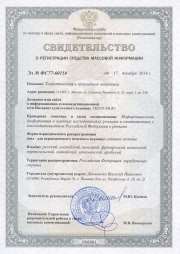MAIN PAGE
> Journal "Theoretical and Applied Economics"
> Contents of Issue № 02/2018
Contents of Issue № 02/2018
|
Vasin S.M., Gamidullaeva L.A. - Region as a locus of innovation activity
|
|
pp. 1-11
|
DOI: 10.25136/2409-8647.2018.2.20644
Abstract: Globalization of the economy encourages the escalation of innovation activity; development of the interfirm collaboration and chain organizational structures; functional integration and cooperation within the firms alongside state and private laboratories, universities; as well as transformation of the business models. The authors examine the theoretical-conceptual basis of the regional innovation system under the conditions of the so-called “glocalization” of the economy. The evolution of network approach in the research of foreign authors is presented. The subject of hits work is the establishment and development of regional approach towards the examination of innovation processes. The article demonstrates the factors that substantiated the transition from the dominant over many years in theory and practice innovation activity of the concept of national innovation system to the concept of innovation systems of the regions. The network approach towards establishment of the innovation systems of the regions is rationalized. The authors form an original perspective of the premises of development of the theory of regional innovation systems, as well as substantiate the advantaged of examination of the innovation processes at the regional level.

|
Economic theory and history of economic thought |
|
Khorin A.N., Brovkin A.V. - Historical experience of mutual insurance in Russia as a base for development of modern industry non-commercial insurance
|
|
pp. 12-21
|
DOI: 10.25136/2409-8647.2018.2.26075
Abstract: This article is devoted to the analysis of the historical scientific-practical experience of mutual insurance in pre-revolution Russia and during the USSR era. Based on the study of a substantial amount of historical and modern publications it is demonstrated that the mutual (non-commercial) insurance was widely used in the Russian Empire. The main objective of this work and its scientific-educational value lies in the increase of knowledge and informing of the broad reader base on the history of mutual insurance as a relevant financial instrument of risk protection. The article demonstrates the role and significance of the mutual insurance in Russia, including its industry application. The authors come to the conclusion that this experience can be successfully applied even today, if supported by the scientific community with regards to informing a broad spectrum of interested parties, development and proliferation of scientific-theoretical and scientific-practical materials dedicated to mutual insurance.

|
World economy and international economic relations |
|
Tsvirko S.E. - System of state regulation and control over pricing in Great Britain: legislative and institutional aspect
|
|
pp. 22-38
|
DOI: 10.25136/2409-8647.2018.2.26594
Abstract: This article is dedicated to the specificities of state regulation and control of pricing in Great Britain. The object of this research is the approaches towards adjustment of the system of state regulation and control over pricing in Great Britain, considering their impact upon the country’s economy. Examination of the systems of state regulation and control over pricing in foreign countries, particularly in Great Britain, is essential for determining the positive experience for its potential implementation in Russia. The author analyzes the legislation in Great Britain in the area of pricing; reveals the method of direct and indirect regulation of prices; describes the system of regulatory and control authorities over pricing in Great Britain. It is demonstrated that the customs regulation and taxation play a significant role in the developed countries with regards to pricing. The example of Great Britain argues that liberalization in many spheres, absence of overregulation of markets of goods and services, promotion of competition for preventing the monopoly high or monopoly low prices, is stimulating for the economy.

|
Economic theory and history of economic thought |
|
Elshin L.A., Safiullin M.R., Abdukaeva A.A. - Development of the methodology of assessment of the economic growth of the regional economic systems on the basis of unified system of factors (on the example of the Volga Federal District)
|
|
pp. 39-52
|
DOI: 10.25136/2409-8647.2018.2.25892
Abstract: Development of the forecasting models of economic growth, their improvement and adaptation to the transforming conditions of the institutional factors, require constant refinement of the methodological instruments. The key task here is the search for such system of factors that would simultaneously clarify the correction in the trends of economic dynamics and be unified for the entirety of the regional systems, which creates possibility for comparative analysis of the drivers of the economic growth. The object of this research is the unified factors of the economic growth of the Volga Federal District. The subject of this research is the modeling system of the parameters of economic dynamics on the basis of identification of exogenous factors unified for all regional systems. As a result of the conducted assessments, based on the instruments of econometric modeling, the authors determine the models of economic growth of the Volga Federal District based on uniformity of factors, which allowed, using the methods of cluster analysis, grouping them in accordance with the level of response and sensitivity to the changing parameters of the analyzed macro-indicators.

|
Production branches and markets economics |
|
Elshin L.A., Safiullin M.R., Abdukaeva A.A. - The Fourth Industrial Revolution in the Russian Federation: assessment of prospects based on structuring long-term cycles of cutting-edge development
|
|
pp. 53-69
|
DOI: 10.25136/2409-8647.2018.2.25987
Abstract: The subject of this research is the mechanisms of structuring long-term economic cycles of cutting-edge development that form representation and forecasting assessment regarding the prospects and horizons of phase shifts of the ecosystem in the future. The object of this research is the evolution of the national economy in the context of modelling long-term economic cycles. Using modeling mechanism of long-term prospects of economic agents for the period of 1962-2000, the authors determine the trajectories of the phase shifts in the national economic system. This allowed not only identifying the character of cyclic development of national economy within the examined timeframe, but also scientifically substantiating the prospects and parameters of the arrival of the so-called Fourth Industrial Revolution in the Russian Federation. It is proved that based on the developed methodology of structuring cycles of cutting-edge development and its trial on the system of statistical data of national economy over the recent 60 years, that the socioeconomic crisis of the 1990’s was caused not only by the institutional transformations, but also the fact that during this period the long-term economic cycle entered the decline phase, which transformed on the brink of the end of 2000’s and beginning of 2010’s into the inclination phase, allowing substantiation of the conclusion that the phase of long-term growth in Russian economy will not arrive before 2020-2025.

|
Delakhova A.M., Egorova T.P. - Impact of the transportation factor upon pricing on the local markets of petroleum products of the Northern region
|
|
pp. 70-78
|
DOI: 10.25136/2409-8647.2018.2.26060
Abstract: This article reflects the results of a research on the impact of the transportation factor upon the functionality of the local markets on the example of the petroleum products market in the Republic of Sakha (Yakutia). Due to absence of local production on the territory of the region, functionality of the local petroleum products markets completely depend on the level of development of the transportation system with the specificities of the “Northern territories”. The peculiarities of the pricing and specific organizational economic relations within the transportation-logistical system are the results of the impact of the transportation factor. The object of the research is the local markets of petroleum products in the Republic of Sakha. The issues of research of the impact factors of the transportation system upon optimal functionality and development of the local markets with consideration of the specificity of the Northern regions have not been sufficiently studied. The authors determine the key causes of problems in pricing of the petroleum products market, which consists in the territorial disproportions of the level of transportation system and access to these markets; high coefficient of logistics costs of the arctic group of regions in the final pricing of the petroleum products, which leads to uneven competitive conditions in the main petroleum products market.

|
Zhebit E.V. - Risks in development of the international scientific megaprojects
|
|
pp. 79-90
|
DOI: 10.25136/2409-8647.2018.2.25725
Abstract: This article provides the research results of the economic peculiarities of large-scale scientific mega-class projects. The main features of scientific megaprojects and their difference from the ordinary mega-class projects are considered. The author examines the risk characteristics in implementation of the scientific megaprojects, specificity and problems of management with allowance for risk. The article provides the systematization of the types of risks and measures on their minimization, as well as recommendations for the pre-project analysis of the problem or risks substantiated by the internal and external factors affecting the systemic sustainability of a project. The author presents a new methodological approach for assessing the risk factors, which is based on perceiving megaproject as an unbalanced system of stochastic nature. Presence of a high number of risks accompanying the implementation of the large scientific projects requires its precise identification, distribution of responsibility, as well as a certain set of methods for analyzing risks. The shift of technological and financial risks towards the nongovernment participants of megaprojects in terms of the public-private partnership will allow considering the interests of all participants, including the interests and mission of megaproject itself.

|
Gainanov D.A., Klimenteva A.Y. - The development of regional innovative subsystem based on the imbalance model
|
|
pp. 91-99
|
DOI: 10.25136/2409-8647.2018.2.25867
Abstract: This article examines the regional innovative subsystem as a complex of interconnected elements, conditions and factors that initiate and carry out production, distribution and application of the new knowledge ensuring the development of regional economy and its subsystems. The authors review the process of transferring scientific research to the economy that ensures the socioeconomic efficiency of regional development. The article describes substantial essence of the resource provision (personnel, scientific-informative, material-technical) and systemic gaps emerging in the process of transferring scientific knowledge presented in form of the imbalance model. In accordance with the staged of innovative process, the model allows revealing the following imbalances: structural-competent – inconformity of the demand and availability of scientific personnel; demand and supply of scientific research – lack of demand in the industry scientific developments; lack of demand for scientific research – absence of demand in new products. The authors suggest the basic measures for eliminating or reducing the systemic strategic gap and thus ensuring the effective transfer of scientific research into the regional economy.

|
Ivanov P.A. - Financial management of the territories with consideration of gradual development
|
|
pp. 100-109
|
DOI: 10.25136/2409-8647.2018.2.26425
Abstract: The subject of this research consists in the examination of the theoretical methodological aspects of financial management of the territories with consideration of peculiarities of various stages of their lifecycle. In the current conditions of majority of the subjects of the Russian Federation, especially municipal formations, being in the state of low level financial independence preventing them from reaching strategic priorities of the socioeconomic development without the support of the upper channels, there is a growing relevance in improvements to the system of financial management of various levels of territorial formations. One of the promising vectors in increasing the quality of financial management, which is currently largely neglected, is the consideration of the gradual development of the territories. The work defines the concepts of “territorial lifecycle” and “territorial financial management”, as well as determines the correlation between them and their peculiarities, intrinsic to the lifecycle in the context of territorial development. The author systematizes the approaches to the efficiency of the state (municipal) financial management, which allows concluding that there is an insufficient consideration of the stages of the territorial lifecycle.

|
Economic demography and labor economics |
|
Rozanova L.I., Potasheva O.V. - The mobility of factors of production in the regions of the North Caucasus Federal District: the impact of the education level, quality of labor resources and economic structure
|
|
pp. 110-120
|
DOI: 10.25136/2409-8647.2018.2.18373
Abstract: The subject of this research is dynamic processes in economy of regions of the Northwest federal district and the structure of employment on education level. Economic dynamics affect social dynamics, promoting increase of mobility of factors of production. Researches of mobility of factors of production gain relevance due to high variability of external environment and the need to adapt the subjects of the market. Special attention is given to questions of formation of the educational potential in the conditions of modernization of the economy. The innovative orientation of the economy determines improvement of quality of labor, when not only health of the population, but also and education level becomes the basis of formation of the human capital. The novelty of this research consists in discovery of the change in the trend within the structure of the employed population, which manifested in rapid reduction of the portion of workers with high school education during the period of 2005-2007. It is the period of high investment activity, which caused progressive structural shifts and labor mobility. The personnel with secondary professional education at the growing share with the higher education remain the dominating group in structure of the employed population. Streams of labor migration, especially people with higher education, are focused on the cities with high innovative investment potential.

|






